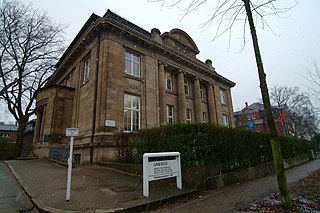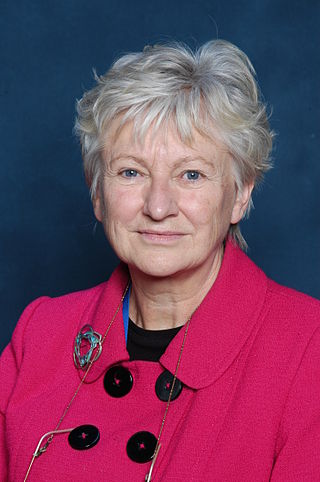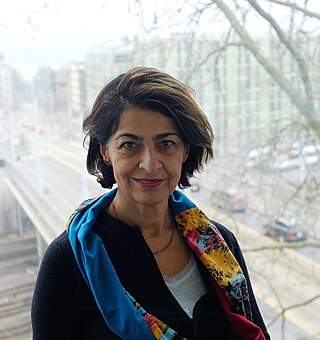Educational research refers to the systematic collection and analysis of data related to the field of education. Research may involve a variety of methods and various aspects of education including student learning, interaction, teaching methods, teacher training, and classroom dynamics.
Education in Denmark is compulsory for children below the age of 15 or 16, even though it is not compulsory to attend Folkeskole. The school years up to the age of fifteen/sixteen are known as Folkeskole, since any education has to match the level offered there. About 82% of young people take further education in addition to this. Government-funded education is usually free of charge and open to all. Denmark has a tradition of private schools and about 15.6% of all children at basic school level attend private schools, which are supported by a voucher system.

The Programme for International Student Assessment (PISA) is a worldwide study by the Organisation for Economic Co-operation and Development (OECD) in member and non-member nations intended to evaluate educational systems by measuring 15-year-old school pupils' scholastic performance on mathematics, science, and reading. It was first performed in 2000 and then repeated every three years. Its aim is to provide comparable data with a view to enabling countries to improve their education policies and outcomes. It measures problem solving and cognition.
Comparative education is a discipline in the social sciences which entails the scrutiny and evaluation of different educational systems, such as those in various countries. Professionals in this area of endeavor are absorbed in advancing evocative terminologies and guidelines for education worldwide, enhancing educational structures and producing a context to which the success and effectivity of education programs and initiatives can be assessed.
International education refers to a dynamic concept that involves a journey or movement of people, minds, or ideas across political and cultural frontiers. It is facilitated by the globalization phenomenon, which increasingly erases the constraints of geography on economic, social, and cultural arrangements. The concept involves a broad range of learning, for example, formal education and informal learning. It could also involve a reorientation of academic outlook such as the pursuit of "worldmindedness" as a goal so that a school or its academic focus is considered international. For example, the National Association of State Universities prescribes the adoption of "proper education" that reflects the full range of international, social, political, cultural, and economic dialogue. International educators are responsible for "designing, managing, and facilitating programs and activities that help participants to appropriately, effectively, and ethically engage in interactions with culturally diverse people and ideas."
Harold J. Noah was an American educator, whose research and writing have focused on comparative education and economics of education. He was born in London, England, and moved to the United States in 1958. His higher education began at the London School of Economics and King’s College, University of London, and was followed by a Ph.D. at Teachers College, Columbia University. He served as Professor at Teachers College, Columbia, from 1964 to 1987. He was appointed to the Gardner Cowles chair in economics of education. He served as Dean of the College from 1976 to 1981. He is widely recognized as a distinguished authority in the field of comparative education.

The UNESCO Institute for Lifelong Learning (UIL), formerly UNESCO Institute for Education, is one of six educational institutes of UNESCO. It is a non-profit international research, training, information, documentation and publishing centre on literacy, non-formal education, adult and lifelong learning. It provides services to UNESCO's Member States, NGOs, and grassroots and community organizations, as well as to partners in civil society and the private sector. The Institute works in close collaboration with its Paris headquarters, with UNESCO field offices in different countries, with sister institutes and with national and international partners.
The European Distance and E-Learning Network (EDEN), originally named the European Distance Education Network - established in 1991, is an international educational association open to institutions and individuals dealing with e-learning, open education, and distance education. EDEN is a not-for-profit organisation, registered as a limited company under English law.
Adaptive comparative judgement is a technique borrowed from psychophysics which is able to generate reliable results for educational assessment – as such it is an alternative to traditional exam script marking. In the approach, judges are presented with pairs of student work and are then asked to choose which is better, one or the other. By means of an iterative and adaptive algorithm, a scaled distribution of student work can then be obtained without reference to criteria.

Angela W. Little is Professor Emerita at the Institute of Education, University of London. She is known for her work in primary education policy and practice in developing countries as well as education planning, program evaluation and assessment. In particular she has focussed in seven main areas:

Robin Alexander is a British educationist and academic known particularly for championing the cause of primary education, for his leadership of the Cambridge Primary Review, and for his research and writing on education policy, culture, curriculum, pedagogy, dialogic teaching and comparative and international education. He is currently Fellow of Wolfson College at the University of Cambridge and Professor of Education Emeritus at the University of Warwick. In 2011 he was elected Fellow of the British Academy (FBA), the UK’s national academy for the humanities and social sciences and chaired its Education Section 2018-21.
The College of Education is one of 15 colleges at The Pennsylvania State University, located in University Park, PA. It houses the departments of Curriculum and Instruction, Education Policy Studies, Learning and Performance Systems, and Educational Psychology, Counseling, and Special Education. Almost 2,300 undergraduate students, and nearly 1,000 graduate students are enrolled in its 7 undergraduate and 16 graduate degree programs. The college is housed in four buildings: Chambers, Rackley, Keller, and CEDAR Buildings.
Internationalization of higher education in theory is "the process of integrating an international, intercultural, or global dimension into the purpose, functions or delivery of postsecondary education." Internationalization of higher education in practice is "the process of commercializing research and postsecondary education, and international competition for the recruitment of foreign students from wealthy and privileged countries in order to generate revenue, secure national profile, and build international reputation." The main components of internationalization of higher education are recruitment of international students, development of international branch campuses, students, staff and scholars exchange programs, internationalization of the curriculum, and research and education partnerships between institutions regionally and internationally.
Nina Yurievna Belyaeva is a Russian public policy researcher, PhD, professor and head of the Public Policy Department. at National Research University Higher School of Economics, Moscow, Russia. Member of Russian Political Science Association, which is a part of IPSA.
An international branch campus (IBC) is a form of international higher education whereby one or more partnering institutions establishes a physical presence in a foreign location for the purpose of expanding global outreach and student exchange. Generally named for their "home" institution and offering undergraduate and graduate programs, graduating students are conferred degrees from one or all partnering institutions, dependent on the agreement. Instruction most often occurs in properties owned or leased by the foreign institution, sometimes with a local partner, and may also include additional services and facilities to mirror Western universities. IBCs are delivered in many formats and currently exist all over the world. As a relatively new method of delivering post-secondary education, IBCs have been deemed successful and yet face continual criticism.
Martin Carnoy is an American labour economist and Vida Jacks Professor of Education at the Stanford Graduate School of Education. He is an elected member of the National Academy of Education as well as of the International Academy of Education. Professor Carnoy has graduated nearly 100 PhD students, a record at Stanford University.
Seu'ula Johansson-Fua is a Tongan academic and educational researcher. Her research explores how indigenous concepts of leadership can be tools in education systems across the Pacific region. She is currently Director of the Institute of Education at the University of the South Pacific.

Gita Steiner-Khamsi is a Professor of Comparative and International Education at Teachers College, the Graduate School of Arts and Sciences, and the Harriman Institute, Columbia University in New York.





